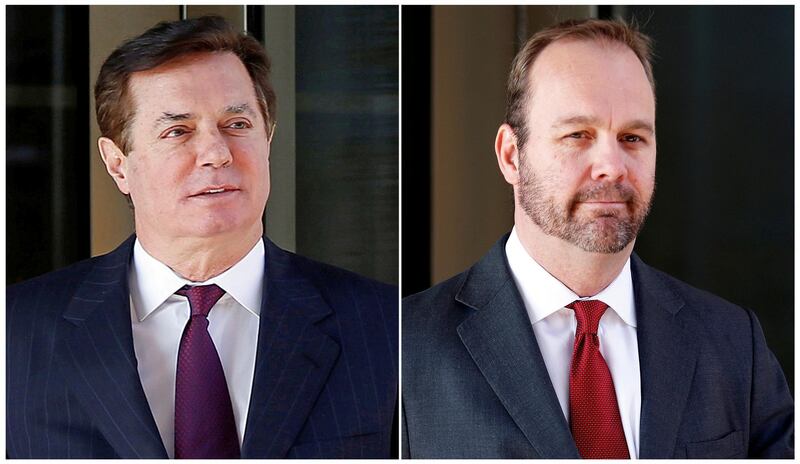The star witness in the trial of former Trump campaign chairman Paul Manafort on Tuesday retook the stand to describe how millions of dollars from Ukrainian shell companies was routed through Cyprus as part of a complex scheme to allegedly hide payments from US tax authorities.
Rick Gates, who had at one time been Mr Manafort’s protege, said some of the money – paid by clients of their political consultancy – was classified as loans rather than income to reduce tax exposure.
He described an agreement involving the “shelf companies” directing that the defendant be paid $1.1 million (Dh 4 million) and another that he be paid 3 million euros (Dh 12.7 million).
He also said hundreds of emails showed the defendant approved payments from the accounts, which were not declared to accountants preparing his tax returns.
Members of the public queued from 6 a.m. to get a seat inside the Virginia courtroom and a chance to hear his blockbuster evidence.
______________
More on the Manafort trial:
Longtime Manafort deputy Rick Gates admits embezzlement
Manafort's financial staff reveal opaque nature of his finances
Prosecutors tell jury ex-Trump campaign chief Paul Manafort hid wealth
______________
Gasps echoed around the room as he appeared for the first time a day earlier. When he returned yesterday, he began with a step by step guide to the way shell companies were used in Cyprus.
Greg Andres, for the prosecution, asked whether the companies sold a product or employed staff.
No, replied Mr Gates. “The purposes of the companies was to accept payments and to make payments,” he said.
Mr Manafort, 69, denies all 18 charges stemming from consultancy work that predated the Trump campaign. He could spend the rest of his life in prison if he is found guilty.
It brought Mr Gates face-to-face with his former mentor. He pleaded guilty to financial fraud and lying to investigators as part of a plea deal earlier this year.
He wasted little time in revealing what he knew, describing first how he embezzled hundreds of thousands of dollars from his former boss and then testifying about alleged fraud.
“I was the one who helped organise the paperwork,” he said.
His much-anticipated appearance lies at the heart of the prosecution case.
Greg Andres, a government attorney, asked: “Did you commit crimes with Mr Manafort?”
“Yes,” came the one-word response.
He carefully avoided looking at Mr Manafort. In contrast, the defendant maintained a laser-like focus on his former business associate throughout his bombshell testimony.
Mr Gates said he and Mr Manafort had 15 foreign bank accounts that were not reported to the federal government.
“At Mr Manafort's request, at different points in the year, we did not disclose the foreign bank accounts," said the man previously described by witnesses as Mr Manafort’s right-hand man.
He also admitted to concealing millions of dollars in foreign bank accounts on Mr Manafort's behalf and to falsifying loan applications and other documents to help Mr Manafort obtain more in bank loans.
Prosecutors allege that the two men conspired to hide a significant chunk of the $60 million (Dh 220 million) that Mr Manafort earned through his political lobbying in Ukraine for ousted president Viktor Yanukovych.
They worked for him and other pro-Russia candidates from the Party of Regions, softening their image, ahead of parliamentary elections in 2006 and 2007. They are credited with helping Mr Yanukovych become president in 2010.
He also worked on projects with Oleg Deripaska, a Russian energy titan and then one of the world's richest men.
But when Mr Yanukovych lost power and fled to Russia, the business struggled and prosecutors claim Mr Manafort lied to banks to obtain loans to help maintain his life of luxury.
Earlier, witnesses described his expensive lifestyle, including his $15,000 ostrich suit, $21,000 designer watch and luxury cars. In several cases, purchases were made with wire transfers from banks overseas, they said.
The trial is expected to last two more weeks and the judge has signalled his intention to keep to a strict timetable.
Tensions between US District Court Judge TS Ellis III and the prosecutions have frequently bubbled to the surface.
Mr Ellis has warned prosecutors not to use the pejorative term “oligarch” to describe Ukrainian or Russian politicians and scolded both sides for rolling their eyes.
He clashed with prosecutors once again on Monday as they tried to introduce Mr Gates’ passport as evidence of his trips to Ukraine and Cyprus, where some of the accounts in question were apparently located.
Mr Ellis stepped in to hurry things along. “Let’s get to the heart of the matter,” he said.
“Judge, we’ve been at the heart...” said Mr Andres before being cut off.
“Just listen to me,” said Mr Ellis loudly as he demanded a faster pace.
The defence was due to cross-examine Mr Gates on Tuesday afternoon. So far, it has insisted that Mr Manafort may have made mistakes but that it was Mr Gates who was to blame for any wrongdoing.
"Rick Gates had his hand in the cookie jar, and he couldn't take the risk that his boss might find out," is how Thomas Zehnle put it in his opening statement last week.






